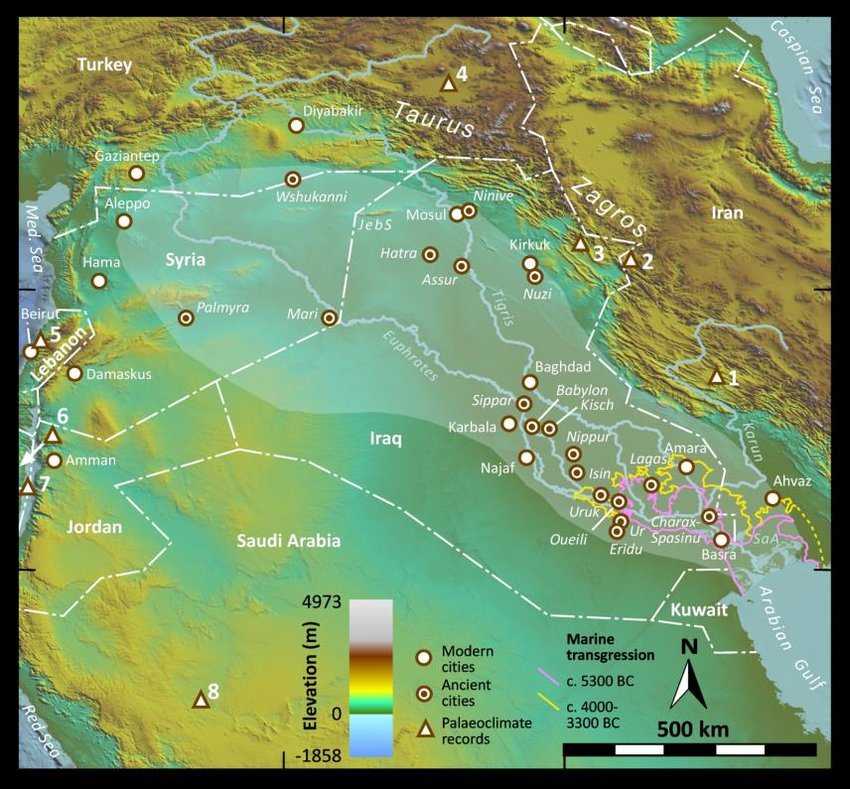The Great Flood
(Biblical Deluge)
Hundreds of ancient cultures from around the world share a similar story. A man warned by a god to build a seafaring vessel, so he can survive the coming flood. The oldest known records of this flood are referenced in Ancient Near Eastern literature, but is most known from Abrahamic religious texts. Many have concluded the story to be based on actual events due to its popularity throughout the ancient world. If the flood was real, when did it occur, and which regions were impacted?
What we know of this flood comes from the literature itself. The oldest known records first appearing around 2600 BCE in various versions of the Sumerian King List, then by 2300 BCE it was featured in its own epic, The Eridu Genesis. Shortly after, the flood is featured in the world's oldest known story, The Epic of Gilgamesh, which was written around 2150 BCE (The same time and place as the supposed birth of Abraham). With all of the information we can gather from these and other texts not mentioned, the flood occurs during the lifetime of a certain individual who most know of as Noah, and between two very specific occurrences in history. In the Sumerian King List, the flood occurs between the founding of Dynastic Kish and the fall of Shuruppak due to the flood itself.
The 1st Dynasty of Kish was established around 2900 BCE, while the fall of Shuruppak can be archaeologically confirmed to have occurred during the Jemdet Nasr period, due to the existence of a specific pottery found in the flood strata that only existed during the Jemdet Nasr Period around 3000 BCE. It should also be noted the archaeological founding of Shuruppak is estimated to be around 3200 BCE. With this information, we are able to conclude the Great Flood occurred approximately 3000 - 2900 BCE.
Evidence of a massive flood can be found throughout Southern Iraq, occurring during the exact window proposed above. During this period, the Sumerian Civilization's most prosperous of cities were located within close proximity to the Tigris and Euphrates rivers, as these were the rivers of life, or of creation. Beyond the Sumerian's borders, there were no cities, there was no civilization. At this point in history, these cities were the entire civilized world. If the flood did occur, when considering the geological data and literature, it is clear that it was not worldwide. So in what capacity did it occur and what was the impact zone? Where did it come from and how did it begin?
The Jemdet Nasr flood devastated nearly all Sumerian cities aside from a few that were farther north or away from lowlands. To the survivors, the flood had destroyed the entire world. Geological data confirms the Jemdet Nasr flood was from the Euphrates River. Is there any information in the literature that supports this? The Atrahasis Epic is perhaps the most in depth account of the flood currently known. In this text it describes the Gods' desire to create the flood, and also mentions how. While raining one day, the ruling god asks his sons to overflow the irrigation canals. In doing so, the flood is formed, the flood survivors ride their vessel to safety, and repopulate the land (land and earth are the same word in cuneiform). In another text, The River of Creation, it states the flood could not be created until the River of Creation itself was irrigated. Like the archaeological data, from these texts we can conclude the source of the Great Flood to be from the Euphrates River itself.
If we know the flood to have been caused by one of the gods, what is the exact reason? Mesopotamia is Greek for land between rivers. These rivers were the lifeblood of the land. The Sumerians learned from their predecessors, the Ubaid, that complex irrigation channels not only allows easier water access for agriculture, but also allows the canal inspectors to monitor water levels. The Euphrates was well known for flooding, and without these canals and their inspectors to monitor them regularly, they would certainly overflow and cause devastation. According to some historical accounts, the Babylonians would regularly flood the river to allow silt to wash over the land, to revitalize it. It is no question they had the ability to, but what drove them to do such a thing? In the Atrahasis Epic, noise is the main factor which drives Enlil to cause the flood. This appears to be a common factor among elder and younger generations, for example noise was one of the reasons the primordial gods wanted to kill the younger gods. In the Enochian account, the Watchers had released the secrets of heaven to Man, along with created the Men of Renown, which caused God to create the flood and wash it all away.
To conclude, the Great Flood that most assume to be worldwide was based off a local river flood during a time before an advanced writing system had been developed. It would be only 100 years later before distant cities and cultures began to learn of the Great Flood. Travelling to Ebla, through Canaan, and into Egypt, as well as East through Elam and via trade all the way to the Harappan and beyond. If the story was picked up by Proto-Indo-Europeans, which it seems clear that it was, they would have carried it to the Atlantic, and Pacific, as early as 1800 BCE! Before any other form of writing existed besides Ancient Near Eastern and Egyptian texts. This explains why we can number each account of the flood chronologically and reveal a pattern which shows the source to be Southern Iraq, 3000 BCE.
🐍🍎#eatthefruitinc






